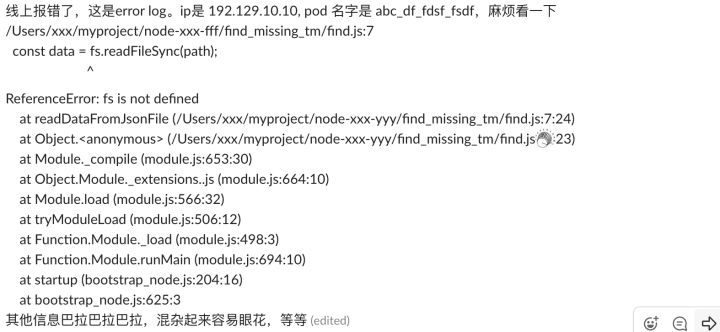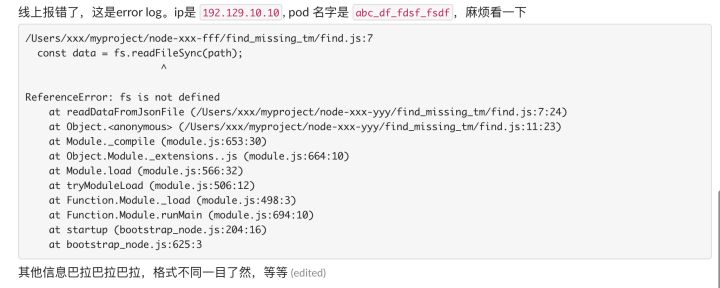At work, in addition to writing code, programmers often need to communicate with other people, such as:
- Communicate with product manager about requirement design and realization
- Use middleware from other departments and consult them about related issues
- Encounter online problems, communicate with relevant departments
- Task collaboration within the group, communication between group members
- ...
Therefore, communication skills are also an important soft skill for programmers. During the interview, no matter how good your skills and poor communication skills are, you may be rejected by the interviewer.
Next, share some of my practical communication skills
(Declaration in advance: All examples in this article are purely fictitious. If there are any similarities, it is a great honor~)
1. Provide sufficient information
Pay special attention to this when communicating with other departments.
For example:
One of your online kubernetes pod is created abnormally, and you need to ask the kubernetes infrastructure group for help (report a problem)-usually by sending messages in the corresponding group on communication tools (such as slack, enterprise WeChat).
Super negative example:
We have a problem! Can anyone help?
I have really met this kind of person, and the useful information provided by the above sentence is almost zero.

counterargument:
We have a pod creation exception, please help us to see
For the kubernetes infrastructure group, the only valid information provided in the above sentence is "pod creation exception". In addition, which namespace do you use? Which cluster? pod name? The most important information is missing.
Therefore, they can only continue to ask you these questions, and then wait for your answer, and then debug after getting your answer. If you don't see their question, you will only reply after a long time, and they will do other things after waiting for a long time without reply. The communication efficiency is very low.
Therefore, when communicating (especially with employees of other departments/groups), you must provide all necessary information in a timely manner to give the other party a complete context .
Positive example:
We have a pod creation exception, namespace is xxxxxx, cluster 3, and pod name is abc. The same pod specification can be created normally in another cluster 2.
If you express this way, the other party will get all the necessary information at once and can start to check the problem immediately.
2. There is a beginning and an end, beginning and ending
I learned this deeply during my internship. At that time, the boss (Cantonese) patted me on the shoulder and said: "...The last time this problem was solved, I should be told in time, that is (Cantonese) ) As the saying goes-you need to be accountable ..."
My personal understanding:
When dealing with things, you must give feedback to relevant people (colleagues, group leaders or other group members) in time .
such as:
- If you encounter problems, report in time;
- After the group leader knows the problem and decides to postpone the processing, you have to create a task record (such as a jira ticket or a redmine ticket or other task record tools);
- After completing the task record, inform the team leader in time and share the link;
- If the halfway problem involves other situations, you should also synchronize the information with the team leader in time;
- If you solve the problem in advance, remember to inform the relevant people.
The advantage of such communication is that it allows all relevant personnel to keep the information synchronized, so that they feel that the situation is under control , and also avoids unnecessary problems.
Such as:
- Another colleague: "Ah? This problem has been solved, then I was just in vain?"
- Team leader: "Why don't I know about this?"
- Other affected colleagues: "Why don't you tell us if the problem is solved? We are waiting here"
3. Friendly text format
The internal communication tools of the company are usually slack (foreign company), corporate WeChat, DingTalk, or even internal self-made tools.
Sometimes when reporting bugs or other communication, you need to post logs, links or even code snippets.
We can set the text format for these special fragments to make the reading experience more friendly.
Take slack as an example
Version without any text formatting

A version with simple processing of special text

The latter obviously has a better reading experience-good communication is not only to effectively exchange information, but also to make the whole process comfortable and smooth.
Most of the tools have simple rich text editing functions, and it does not take much time to do some text formatting.
 Slack's rich text toolbar
Slack's rich text toolbar
4. Maintain a basic polite attitude
This is a basic workplace etiquette, especially when communicating with colleagues in other groups/departments, try to be friendly and polite.
Use "please", "thank you", "trouble" and "you're welcome." These polite words, seemingly simple to say a few more words, can keep communication comfortable and pleasant.
I have also met some strange colleagues who use unfriendly words
such as:
"@我的工名Solve the problem of xxx, and tell me when you are done!"
——(You are not my leader, why are you arrogant?)
"@Our group name, is there a problem with your xxx function? I keep reporting errors here."
——(On your side there is a problem, others are okay, then who do you think is the problem? Question others before Can't you look at the documentation to see your own code?)
When encountering such a colleague, will the other party be willing to help deal with the problem seriously?

About programmers' workplace communication skills, I will share them here.
In the programmer's workplace, although technology is important, emotional intelligence is also very necessary. Don't want to be popular, but please don't be "disgusted" by colleagues.
Do you have any communication skills or short stories about workplace communication, please leave a message to share or complain.